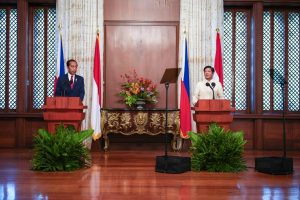Defense and energy cooperation topped the agenda during yesterday’s meeting between Philippine President Ferdinand Marcos Jr. and his Indonesian counterpart Joko “Jokowi” Widodo.
Jokowi arrived in the Philippines on Tuesday for a three-day state visit, part of a regional tour that will also take him to Brunei and Vietnam later this week. He was received with pomp yesterday at Malacañang Palace, where he held a one-on-one meeting with Marcos.
In addition to marking the 75th anniversary of diplomatic relations between the two nations, their talks focused overwhelmingly on border and security cooperation, according to statements from both sides.
“As immediate neighbors and fellow archipelagic states, the Philippines and Indonesia agreed to continue our cooperation on political and security matters,” Marcos said, according to a statement from his office.
“Our shared historic roots are deep, and thanks to our close kinship and our cultural ties that we continue to promote and we continue to allow to prosper, the Philippines and Indonesia enjoy this affinity for one another.”
The meeting came after a year of intensifying tensions in the South China Sea, where China has ramped up its efforts to advance and defend its expansive “nine-dash line” claim. In particular, it has aggressively laid claim to waters lying within the Philippines’ Exclusive Economic Zone, leading to a string of tense encounters, including several in which Chinese ships have rammed Philippine vessels seeking to resupply the small detachment of troops on Second Thomas Shoal in the Spratly Islands.
Marcos added that he and Jokowi “had a fruitful and honest discussion on regional events of mutual interests,” including recent developments in the South China Sea. The Philippine leader said that both countries “stressed the universality” of the 1982 United Nations Convention on the Law of the Sea (UNCLOS), “which sets out the legal framework that governs all activities in the oceans and in the seas.”
Jokowi also said Manila and Jakarta “agreed to strengthen border cooperation,” accelerate the revision of border patrol and border crossing agreements, and settle continental shelf boundaries. The two sides also discussed “strengthening defense cooperation, which includes the buying and selling of defense equipment,” Jokowi said.
Jokowi’s state visit reciprocated the trip that Marcos made to Indonesia in August 2022, his first as president.
Yesterday also saw the Philippines and Indonesia sign a memorandum of understanding on cooperation on energy cooperation. According to the Philippine Department of Energy, the agreement will facilitate cooperation between their respective business sectors, “particularly during periods of critical supply constraints on energy commodities such as coal and liquefied natural gas.”
During their meeting, Marcos also reportedly asked Jokowi to grant clemency to a Filipina migrant worker currently on death row in Indonesia. According to BenarNews, Mary Jane Veloso, now 39, was arrested at an Indonesian airport in April 2010 after the discovery of 2.6 kilograms of heroin in her suitcase. Despite claiming she had no knowledge of what she was carrying, Veloso subsequently received a death sentence under Indonesia’s draconian anti-drug laws.
In 2015, her execution was postponed after appeals by the Philippine government, which claims that she was a victim of human trafficking and has called on numerous occasions for her release. Marcos asked Jokowi to reexamine the case when the two met on the sidelines of the ASEAN Summit in Labuan Bajo, Indonesia, last May.
During the meeting, Marcos “expressed hope that the progression of the case of Ms. Veloso will merit her clemency at the appropriate time,” Theresa Lazaro, an undersecretary at the Philippine Department of Foreign Affairs, said in a statement. She added that the Philippine government “will continuously exhaust all efforts to assist Ms. Veloso and her family.”
As Jokowi and Marcos met at Malacañang, representatives from the advocacy group Migrante International delivered to the palace a handwritten letter by Veloso’s family, requesting that Jokowi grant her clemency before he leaves office in October. Labor groups, who view Veloso’s case as an encapsulation of the challenges facing overseas Filipino workers, also held a concurrent demonstration calling for her release.

































